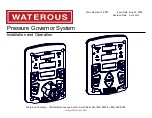
LISST-SL V2.1
User’s Guide
18
IV.
Using the LISST-SL System in a
Laboratory
1. First
Assembly and
Test in
Laboratory
14,20,21
17,18,19
Now that you have become familiar with the subsystems,
LISST-SL sensor, the B-reel, and the TCB, we describe a
test assembly in the laboratory and basic operations.
[
For this test,
make sure the instrument has been at room
temperature for at least 4 hours, and the water you use is
also at room temperature
. Temperature difference
between the instrument and water can cause scintillation
of the laser beam and
invent
large particles.]
System Integration:
For this test, follow the steps below:
Place the LISST-SL on the provided foam
stand. Position the front stand under the inlet
nozzle, so the LISST-SL is at a slight angle,
pointing down.
Using the black cable, connect the LISST-SL
to the TCB. Do not turn on power.
Slide the copper coil over the nose of the
LISST-SL and insert the inlet nozzle into the
tygon tubing on the end of the copper tube.
Attach the 0.2um filter cartridge to the tail fin
and connect the filter inlet tube to the pump
outlet quick disconnect fitting.
Place a carboy filled with clean water less than
one meter above the LISST-SL. Connect a ¼-
inch (6mm internal diameter) tygon tube, about
3-ft (1m) to copper tube quick disconnect
fitting. Use a pinch clamp on the tygon tube.
Remove the vent on the 0.2um filter and open
the pinch clamp on the carboy tube. Let the
filter fill with water completely, put the vent cap
back on to let the outlet tube to fill completely.
Pinch off the carboy tube and remove the tube
from the copper line. Connect the filter outlet
tube to the copper line.
Part fill another ¼-inch (6mm internal diameter)
tube, about 3-ft (1m) long, with water. Connect
the ¼-inch ID tube to the pitot tube. Raise the
free end to apply about 15 cm of head on the
pitot tube. This will simulate a dynamic head on
the instrument.
Turn on TCB power.
Shortly after turning on power at the TCB, the
microprocessor in the LISST-SL will turn on the pump
within it. You will be able to see water moving in the
tubing. You will be able to hear the pump. Wait for
bubbles to escape. If needed, use the Pump speed
control button (left) to help bubbles along.
















































